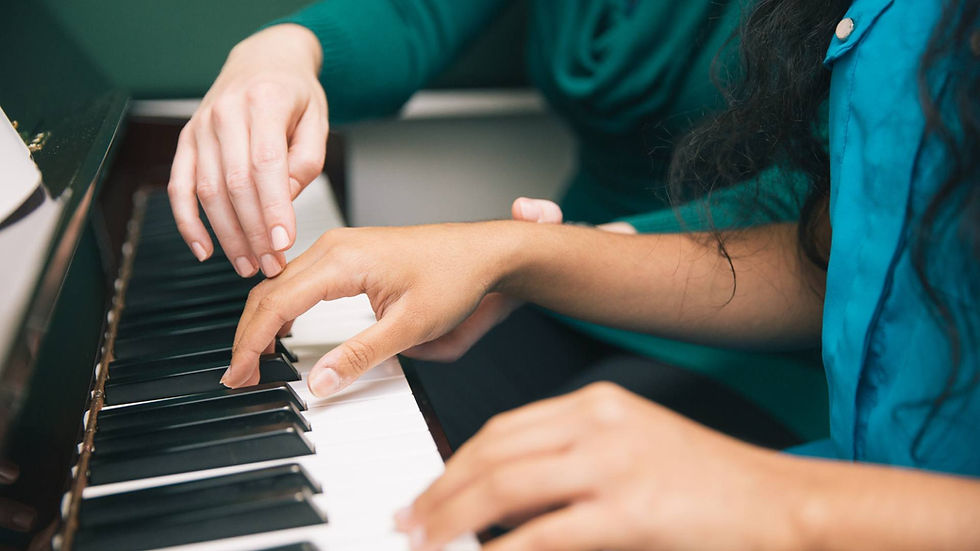Finding the Perfect Balance Between Piano Lessons and Schoolwork
- Alice Christodoulidou

- Jun 7, 2023
- 3 min read

Finding the perfect balance between piano lessons and schoolwork can often seem like a daunting task. With academic responsibilities mounting on one side and a passion for music pulling on the other, students may feel stretched thin. However, by implementing a few strategies and understanding the benefits that piano lessons bring to academic performance, achieving this balance becomes less of a challenge.
The Benefits of Piano Lessons
Piano lessons are more than just learning to play a musical instrument. They also have significant developmental benefits. The analytical thinking skills and focus required in piano lessons often translate into better academic performance.
Memory Enhancement: Piano lessons involve learning and remembering scales, chords, and music pieces, which significantly stimulate memory recall. For instance, when a student learns a new piece of music, they have to remember the specific notes, rhythms, and sequences it involves. This exercise of regularly committing complex musical compositions to memory can enhance the student's memory capacity overall, aiding in their academic pursuits.
Boosted Concentration: Playing the piano requires a high level of focus as the pianist has to read musical notations, use their hands to play the correct keys, control their foot on the pedals, and interpret the piece's tempo and dynamics all simultaneously. This multi-faceted engagement helps students develop their concentration and multitasking skills, which can be transferred to other areas, such as studying for school subjects or completing homework tasks.
Improved Discipline: Learning to play the piano isn't an overnight achievement. It requires consistent practice and patience to gradually master different piano techniques and pieces. This process instills discipline in students as they learn the value of consistent effort and perseverance in achieving their goals. This discipline can carry over into their schoolwork, helping them maintain a consistent study routine and persist even when faced with challenging subjects.
Strategies for Balancing Schoolwork with Piano Lessons
Balance is all about effective management of time and setting priorities. The ability to combine piano lessons with schoolwork effectively is a skill that will also serve students well in their future professional lives.
Setting a Schedule: One of the most effective strategies to balance piano lessons and schoolwork is to create a detailed schedule. Allocate specific time slots for piano practice, homework, studying, and other school-related tasks. Regularly adhering to a well-structured schedule can help students manage their time effectively and reduce stress or feelings of being overwhelmed.
Prioritizing Tasks: Not all tasks are equally urgent or important. Therefore, students should learn how to prioritize their tasks based on their significance and deadlines. For instance, studying for an upcoming exam or working on a major project should take precedence over less urgent tasks. Similarly, preparing for a piano recital might take priority over regular practice sessions.
Using Breaks Effectively: Breaks are crucial for maintaining high levels of concentration and avoiding burnout. Students should incorporate short breaks into their schedule, during which they can relax and rejuvenate. During these breaks, activities such as a quick walk, a bit of stretching, or even some music listening can be beneficial.
Including Leisure Time: All work and no play can lead to excessive stress and reduced productivity. Thus, it's essential to include leisure activities into the schedule. This could involve engaging in hobbies, spending time with friends and family, or simply relaxing. Such activities can help students unwind and maintain a positive outlook.
Piano Practice Techniques: There are also several strategies that can make piano practice more effective and less time-consuming. This includes techniques such as segmenting (breaking a piece down into smaller sections and practicing each individually), slow practice (playing a piece at a slower tempo initially to ensure accurate note-playing and rhythm), and repetitive practice (repeating a challenging section until it can be played correctly).
By employing these strategies, students can strike a healthy balance between their piano lessons and schoolwork, ensuring they excel in both without feeling overwhelmed.
Finding the Right Piano Lessons Near Me
When seeking "piano lessons near me," it is crucial to find a tutor who understands the importance of balancing academics with piano lessons. In Limassol, Alice Christodoulidou Piano and Music Theory Tutor provides such an environment.
Conclusion
By understanding the benefits of piano lessons and implementing effective strategies, students can easily find the perfect balance between piano lessons and schoolwork.




Comments